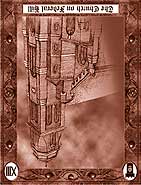Today's Tarot for Jane Fonda
| The One Card spread is the most concise of all spreads, intended to provide a quick take on a situation, or to reduce it to a single point of meditation. The Lovecraft Tarot is a tribute to the gothic writings of the visionary H.P. Lovecraft. It is the deck of choice for explorers of the macabre, and for posing questions that should never be asked. If you would like your own copy of the Lovecraft Tarot, you can buy it now! |
 | The card represents the critical factor for the issue at hand. Queen of Sites (The Church on Federal Hill), when reversed: The dark essence of earth behaving as water, such as ice: A cold but generous host, driven by an overwhelming need for to accumulate and maintain opulence. A person so preoccupied with wealth and security that they can never stop to enjoy either. One who reflects the weaknesses of others, breeding suspicion and mistrust. |
|
|




